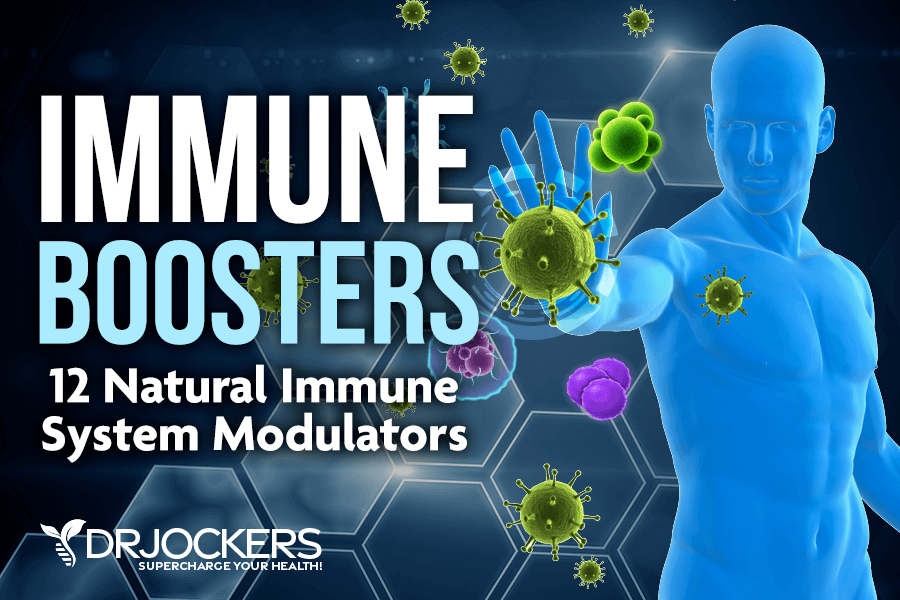 12 Natural Immune System Modulators
12 Natural Immune System Modulators
The immune system is our primary barrier against harmful pathogens in the environment around us. In addition to protecting us from pathogens, the immune system also plays the very important role of controlling precise inflammatory responses that help our body heal damaged tissues. Using immune boosters regularly can help ensure your immune system is functioning at its peak.
The immune boosters mentioned in this article have a modulating effect on the immune system. By this I mean they can be useful in cases of either under or over-active immune states. This way we end up with an immune system that is strong and efficient without causing any negative side effects.
As we will discuss shortly when the immune system is under or over-activated, there can be many side effects. The immune boosters mentioned in this article will help activate a balanced immune system. Whether you are someone susceptible to the seasonal cold or you have an autoimmune condition, these strategies will be a powerful tool to consider.
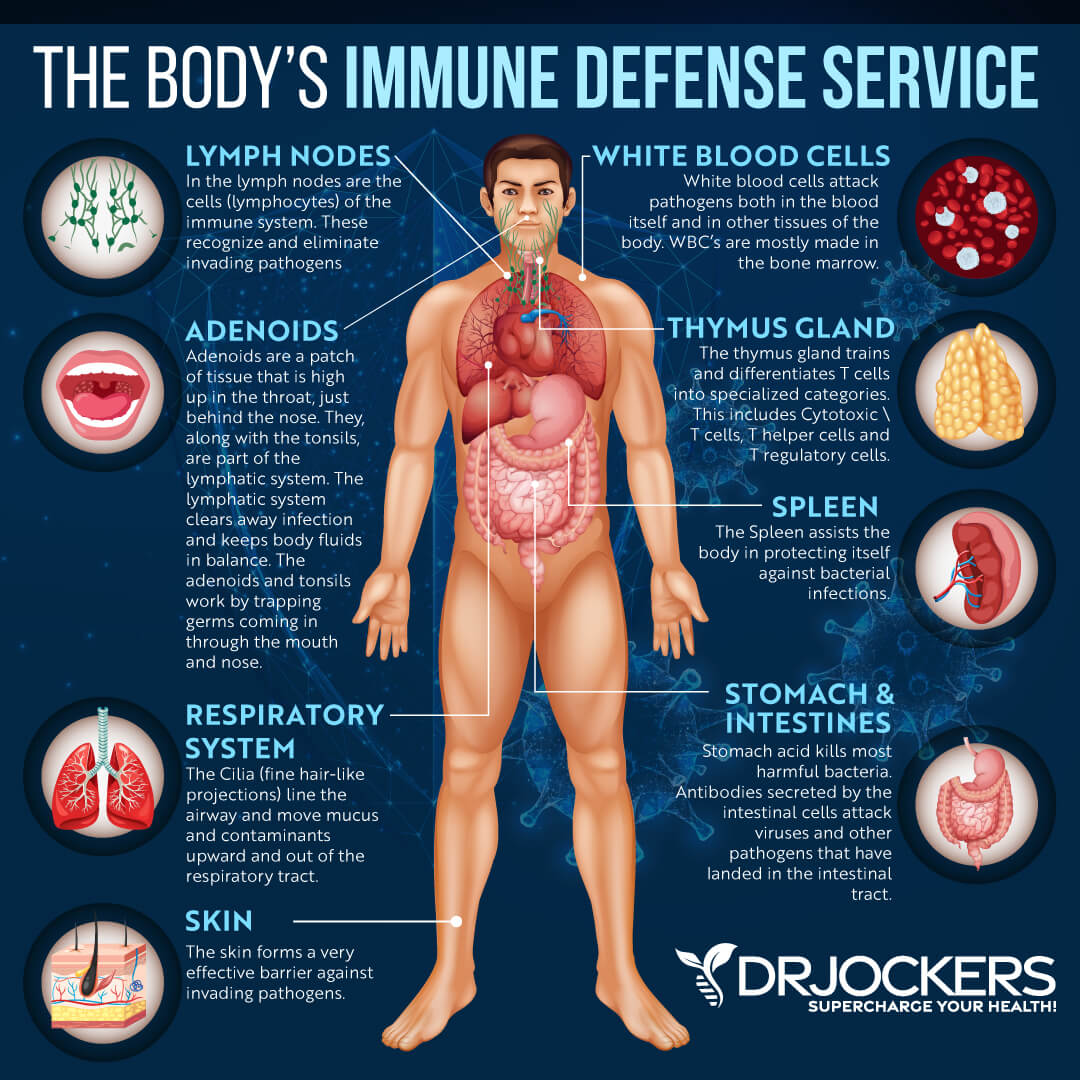
What is the Immune System
Your immune system is absolutely essential for your health and survival. Your immune system keeps you healthy and protects your body from viruses, bacteria, parasites, fungi, and other pathogens.
If you want to understand your immune system, imagine a network of cells and tissues spread throughout your body involving your cells, tissues, and organs. Your immune system is on a constant lookout for invaders and ready to attack and protect you through a so-called immune response. It is your defense system and inner army of protection (1, 2, 3, 4).

Parts of the Immune System
White blood cells, or leukocytes, are some of the main characters in your immune system. They are found in various lymphoid organs, including your thymus, spleen, bone marrow, and lymph nodes. They circulate across your body through blood vessels and lymphatic vessels. They are on the lookout for pathogens, and when noticing one, they multiply and urge others to do the same.
There are two kinds of leukocytes. Phagocytes, including mast cells, monocytes, macrophages, and neutrophils, absorb and break down pathogens by eating them. Lymphocytes recognize previous invaders and attack them if they show up. B lymphocytes make antibodies and let the T lymphocytes know when pathogens show up. T lymphocytes kill compromised cells and alert other leukocytes for help (1, 2, 3, 4).
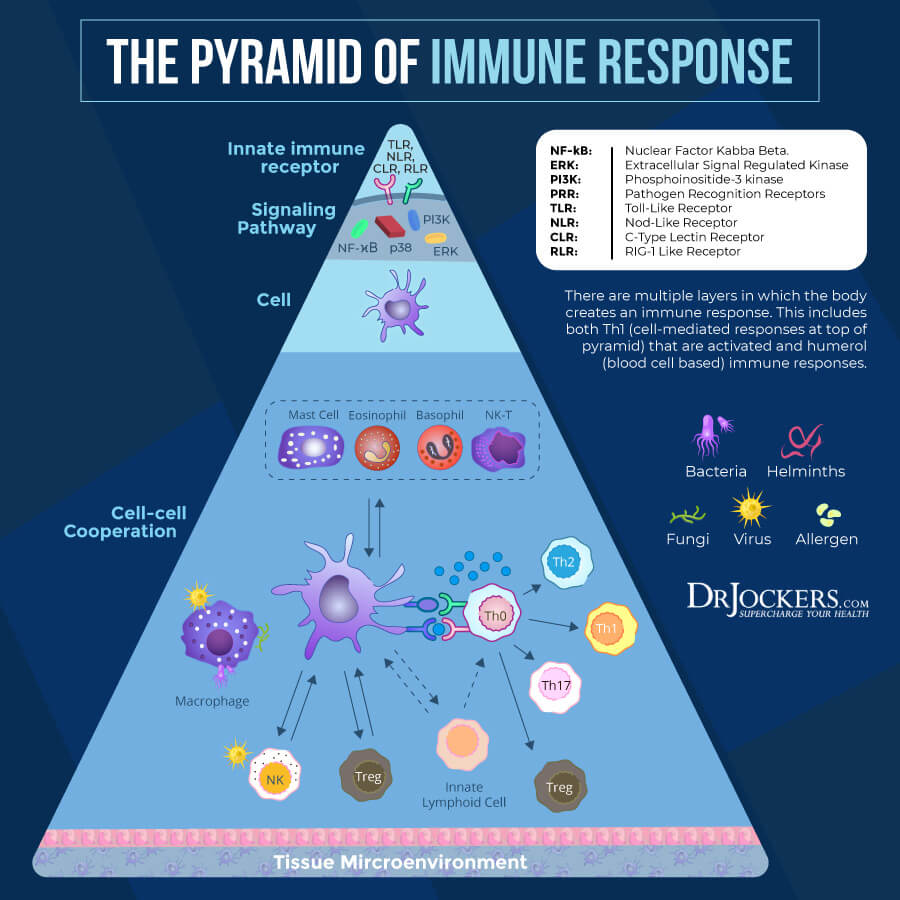
Immune Response Process
Antigens are any substances that are considered to be invaders. They prompt an immune response. They include viruses, bacteria, fungi, toxins, or other foreign materials. When your B lymphocytes, or B cells, spot an antigen, they release antibodies. Antibodies are part of the immunoglobin family and are a type of protein that can lock antigens.
Each antibody has a special function and can help to protect you from a specific antigen. For example, you have different antibodies for the common cold than for the flu or pneumonia. If we encounter a new virus, we don’t have antibodies to it, so it can potentially cause more harm until our body adapts and creates appropriate antibodies because it is a new virus. Antibodies attach to antigens and mark them and then certain immune cells produce phagocytes to kill them.
T lymphocytes, also called T cells or Th cells, help coordinate the immune response. They communicate with cells, and prompt B cells to produce antibodies and phagocytes to kill antigens. Killer T cells or cytotoxic T lymphocytes can also fight other cells and are especially important for fighting viruses and destroying cells infected by a virus (1, 2, 3, 4).
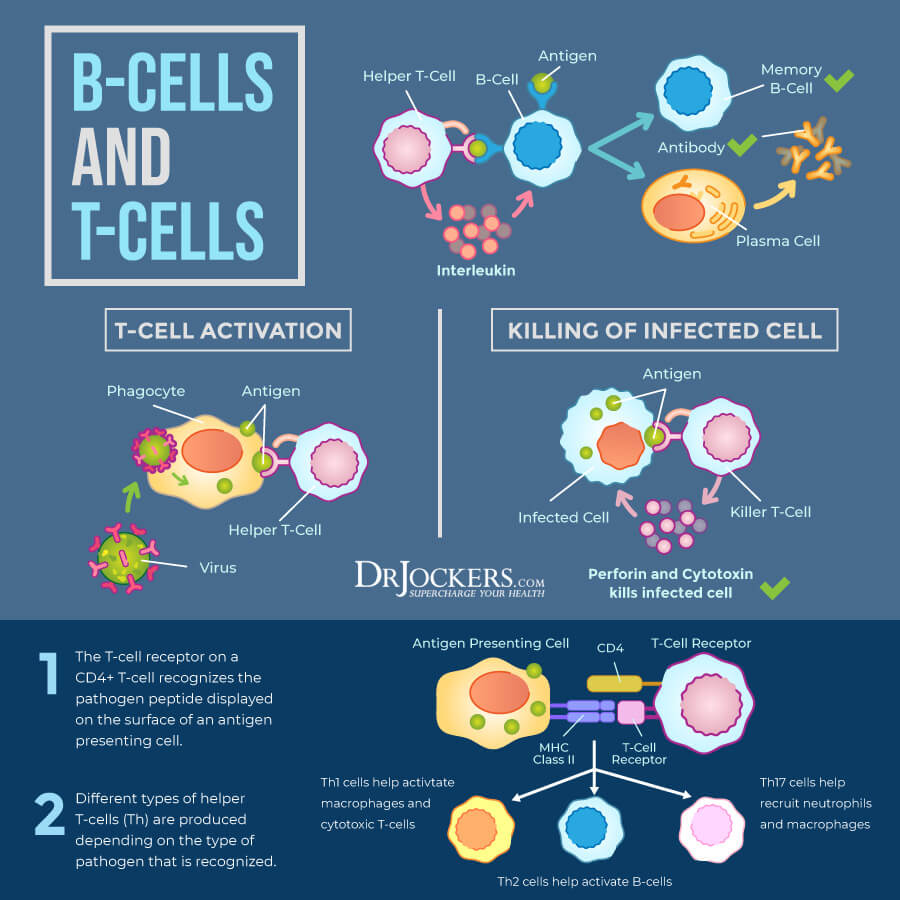
Types of Immunity
Once your body creates an antibody it stays in your body forever. This storage is the reason why you cannot get chickenpox twice and helps your body fight other infections and illnesses. This protection from your immune system is called immunity.
There are several types of immunity:
- Innate immunity: This is the immunity you are born with that allows your body to fight pathogens until you develop adaptive immunity.
- Adaptive immunity: This form of immunity is also called acquired immunity. It is a library of antibodies your body develops through being exposed to and fighting off pathogens throughout your life.
- Passive immunity: This is a form of immunity that includes a baby’s protection through the placenta or breast milk and lasts for a certain period to protect the body until it can defend itself.
- Immunization: Immunization exposes your body to antigens and weakened pathogens to protect your body from specific infections and illnesses in the future.
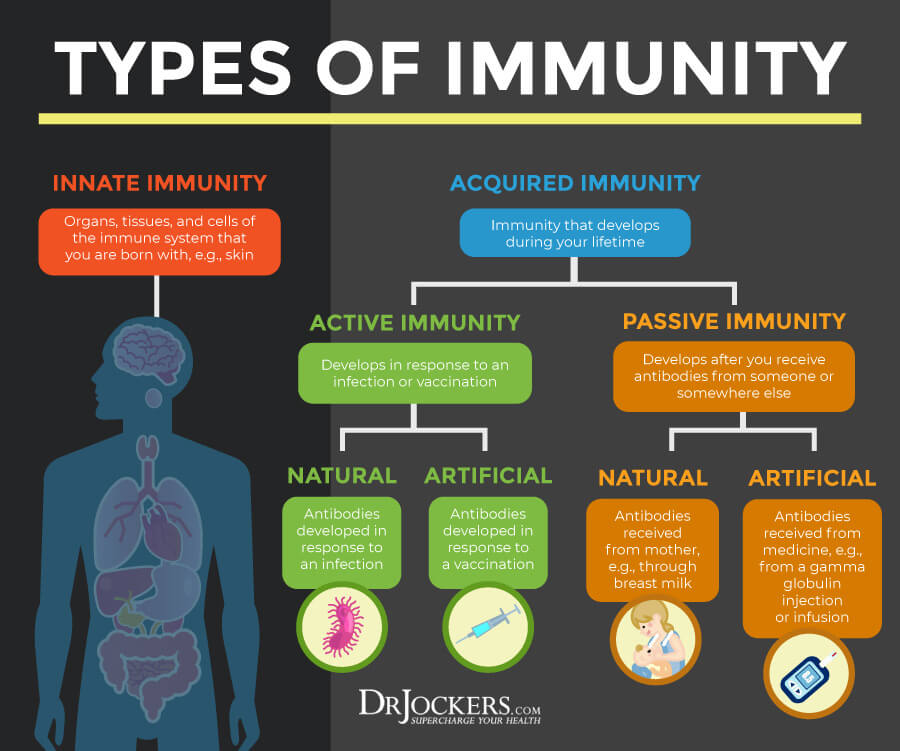
Immune System Problems
Your immune system is very complex, hence there are various ways it can get out of balance and become compromised.
Immunodeficiency
You may develop an immunodeficiency which means that one or several parts of your immune system cannot function optimally. Immunodeficiencies may develop for a variety of reasons, including genetic defects from birth, age, obesity, malnutrition, infections, and alcoholism. AIDS is a form of immunodeficiency acquired from an infection with the HIV virus.
Autoimmunity
You may develop autoimmunity or an autoimmune condition. This means that your immune system attacks and destroys cells in your body mistaking them for pathogens or compromised cells. Autoimmune conditions include Celiac disease, Hashimoto’s disease, rheumatoid arthritis, type 1 diabetes, and lupus.
Hypersensitivity
Hypersensitivity means that your immune system overreacts to something and damages healthy cells. Anaphylactic shock due to an allergen is one example of this.
Even if you don’t have any of these immune system problems, unhealthy lifestyle and dietary choices, toxins, and stress can weaken your immune system and thus compromise your immune system response making you more vulnerable to illness and making recovery more difficult.
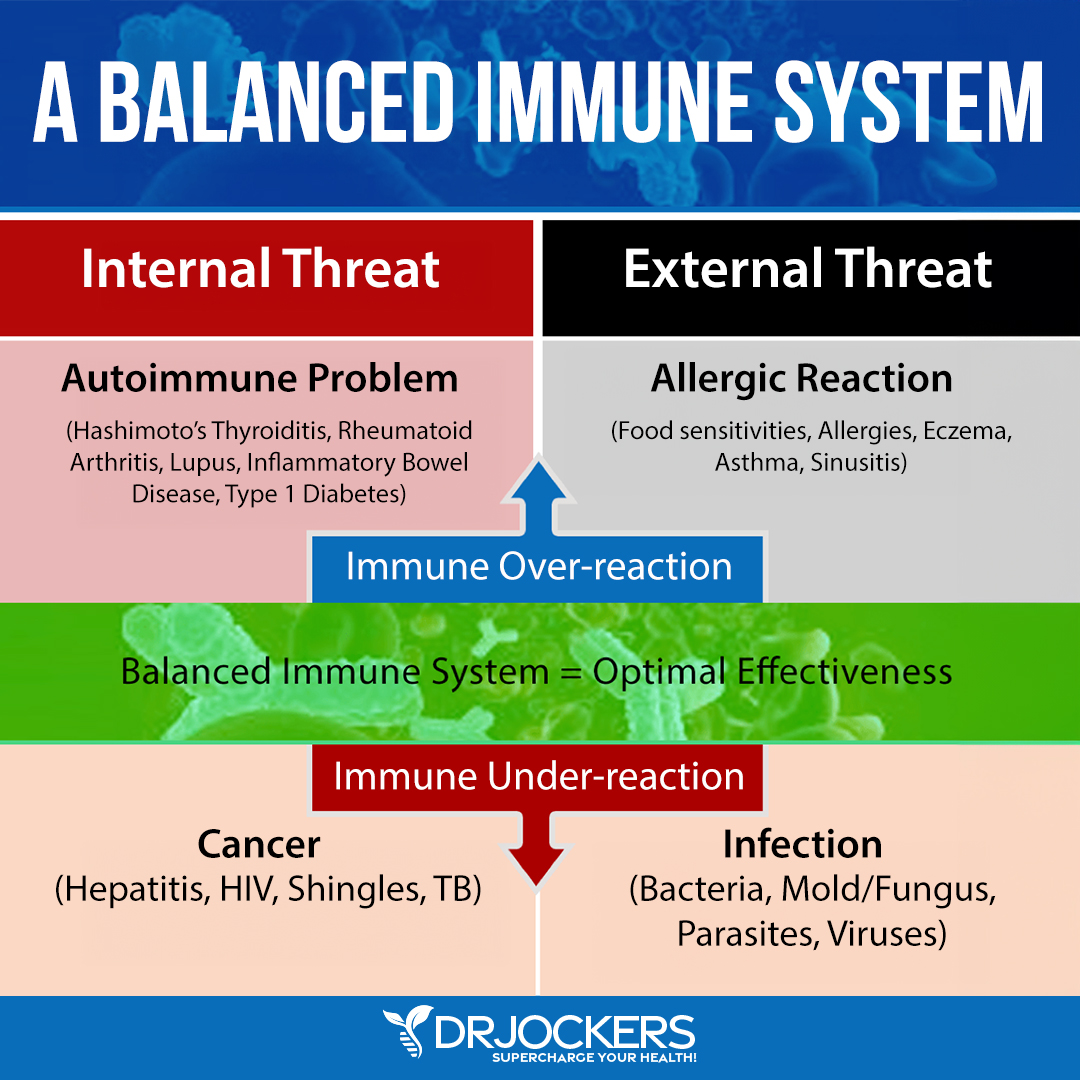
Signs of Low Immunity
When the immune system is not responding to pathogens effectively, this makes you vulnerable to various types of infections. If you always pick up what everyone else has got, get the flu every year, and suffer from chronic colds – immune boosters are your friend!
There are branches of the immune system present in the lymph nodes, respiratory system, skin, and GI tract. These are all places that are subject to infections of different types.
Other more subtle signs of a weak immune system include fatigue, allergies, blood sugar issues, brain fog, food sensitivities, and chronic digestive issues.
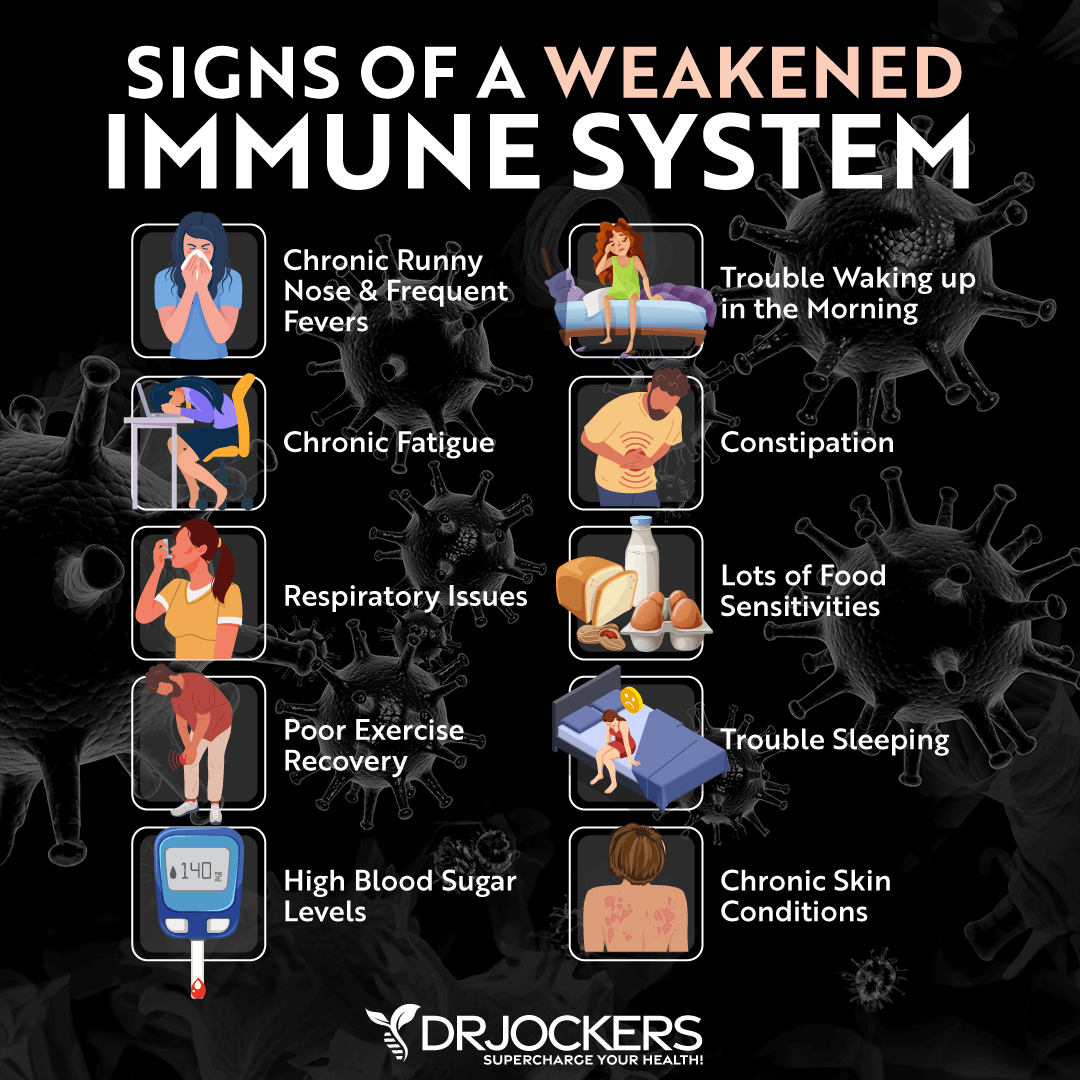
Causes of Poor Immune Function
Before we get into immune boosters, it is vital that we also discuss immune destroyers. Addressing both simultaneously is where you will start to notice a shift in your health.
Consequently, these are also basic strategies to maintain general well-being – I recommend these for anyone who wants to be healthy!
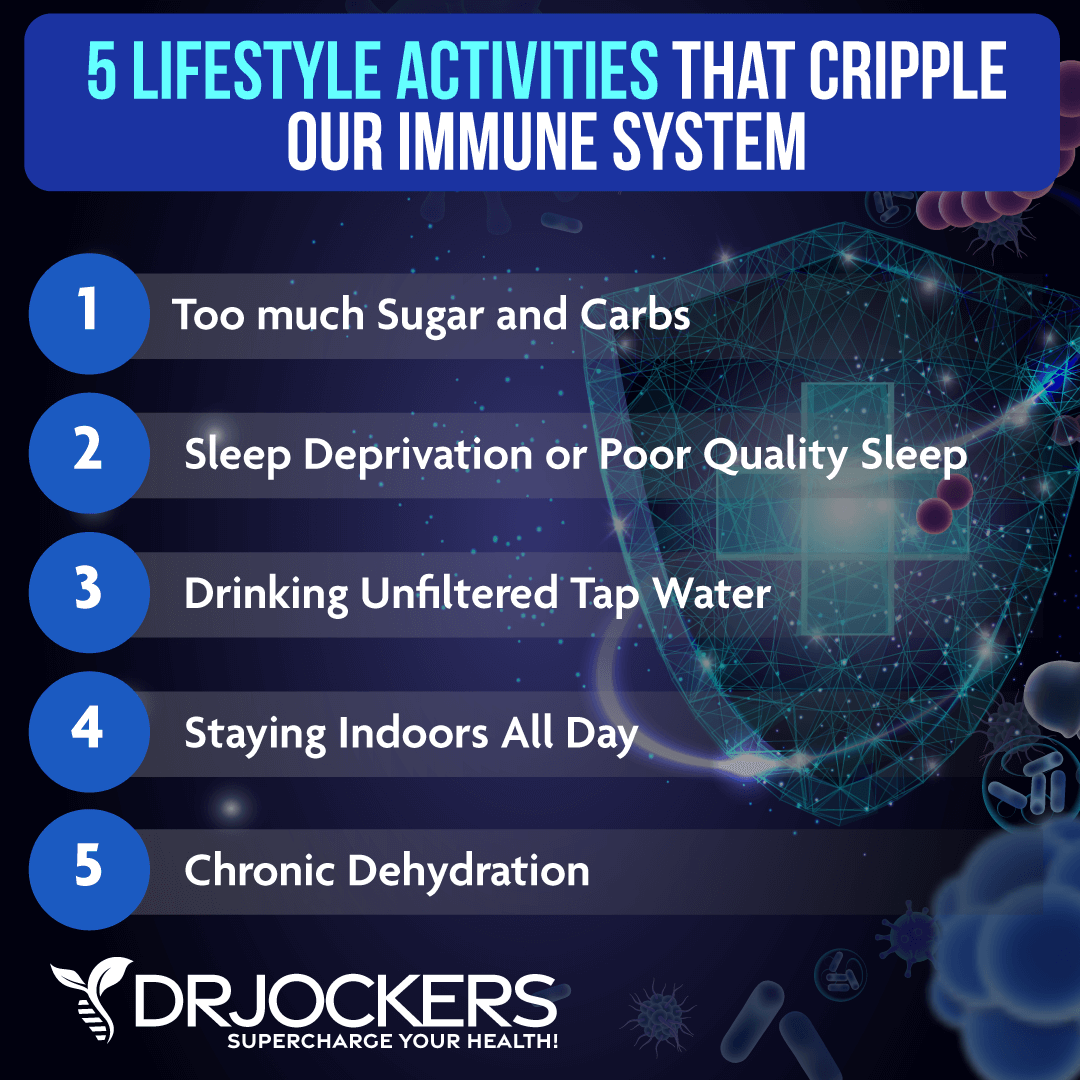
High Sugar and Carb Intake
First and foremost, if a large portion of your diet is sugar and carbs, your immune system will be weakened. One big reason for this is that white blood cells require Vitamin C to perform certain functions.
What is significant about this is that Vitamin C and sugar are very similar structurally and can compete for entrance into cells at the Glut-1 receptor. Glucose often gains priority over vitamin C and therefore hinders immune function (5, 6, 7, 8).
Excess sugar can also feed underlying infections like candida while depleting critical nutrients like Vitamin C, glutathione, and zinc. That means, in the presence of a high-sugar diet, you would need even more immune boosters for optimal function.

Poor Sleep
Getting poor sleep is tied to poor immune function. Consistently getting poor sleep results in the upregulation of certain inflammatory processes as well as poor blood sugar balance and metabolic disorders (9). Getting good sleep every night is one of the most important immune boosters right next to sunlight exposure.
Poor sleep can also cause a heightened stress response in the nervous system. A heightened stress response and elevated cortisol levels over prolonged periods inhibit proper immune system function as well. My article 7 Lifestyle Strategies for Better Sleep goes into my top recommendations for getting the best sleep possible.

Drinking Unfiltered Water
Municipal tap water can have many toxic elements. Things like chlorine, fluoride, heavy metals, etc. all increase the toxic load on the body (10, 11). Investing in a really good water filtration system is one of the best things you can do to improve your immune system.
I recommend systems like Aquatrue or the Berkey system for low-cost filtration. The best water is the UltraLux Triple Action Hydrogen Water Machine which is what I use at home as it is powered by molecular hydrogen which reduces oxidative stress in the body and improves immune function.
Clean water and minerals are what your body needs to properly conduct electrical signals. These electrical signals are how your brain and body communicate and how cells function. Toxic water can inhibit this process and essentially impact every process in the body negatively. Shoot for at least half of your body weight (in lbs.) in ounces of water per day for optimal hydration.
Adding in a squeeze of lemon juice or a few drops of lemon essential oil is a great strategy to add to your arsenal of immune boosters!
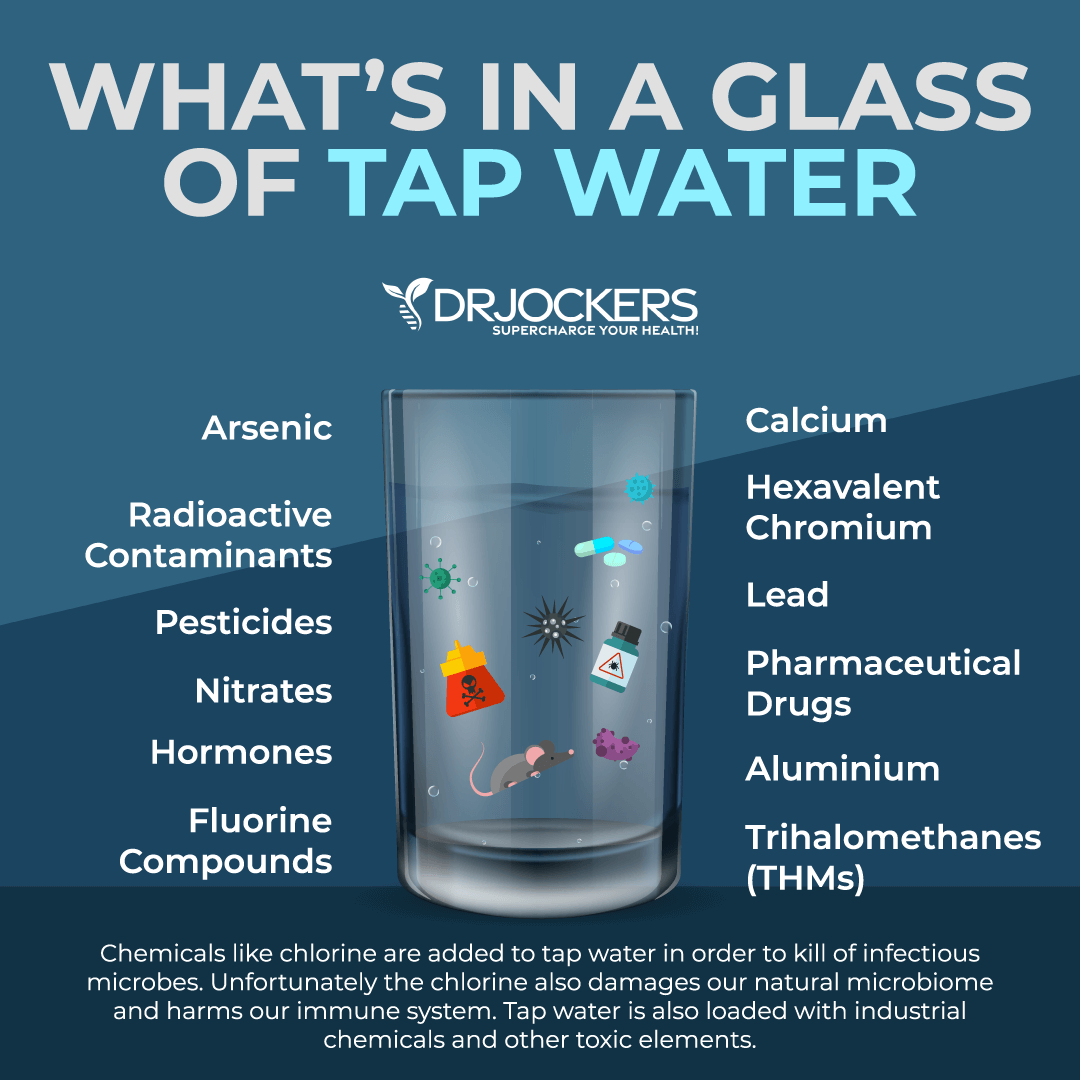
Not Getting Enough Sun
As technology progresses, people tend to spend more time indoors and away from the sun. Sunlight is absolutely vital for proper immune function. Getting sun exposure in the morning primes the circadian rhythm to support optimal sleep at night. Additionally, sunlight assists in the formation of Vitamin D which has immune-modulating benefits as well.
Spending more time indoors can be harmful when you also consider indoor air quality, artificial light exposure, and EMF exposure. Getting unobstructed sun exposure when you wake up and around midday are both important for the immune system.

Natural Immune Boosters
Once you have the factors above accounted for, the following list of immune boosters will be even more effective. These nutrients all play unique roles in boosting the immune system to both help fight off unwanted pathogens as well as control inflammatory pathways in the body.
Your body was created to overcome the challenges of the environment. However, you must be an active participant and work to make your body stronger and more resilient to stress. These nutrients will help you do that!
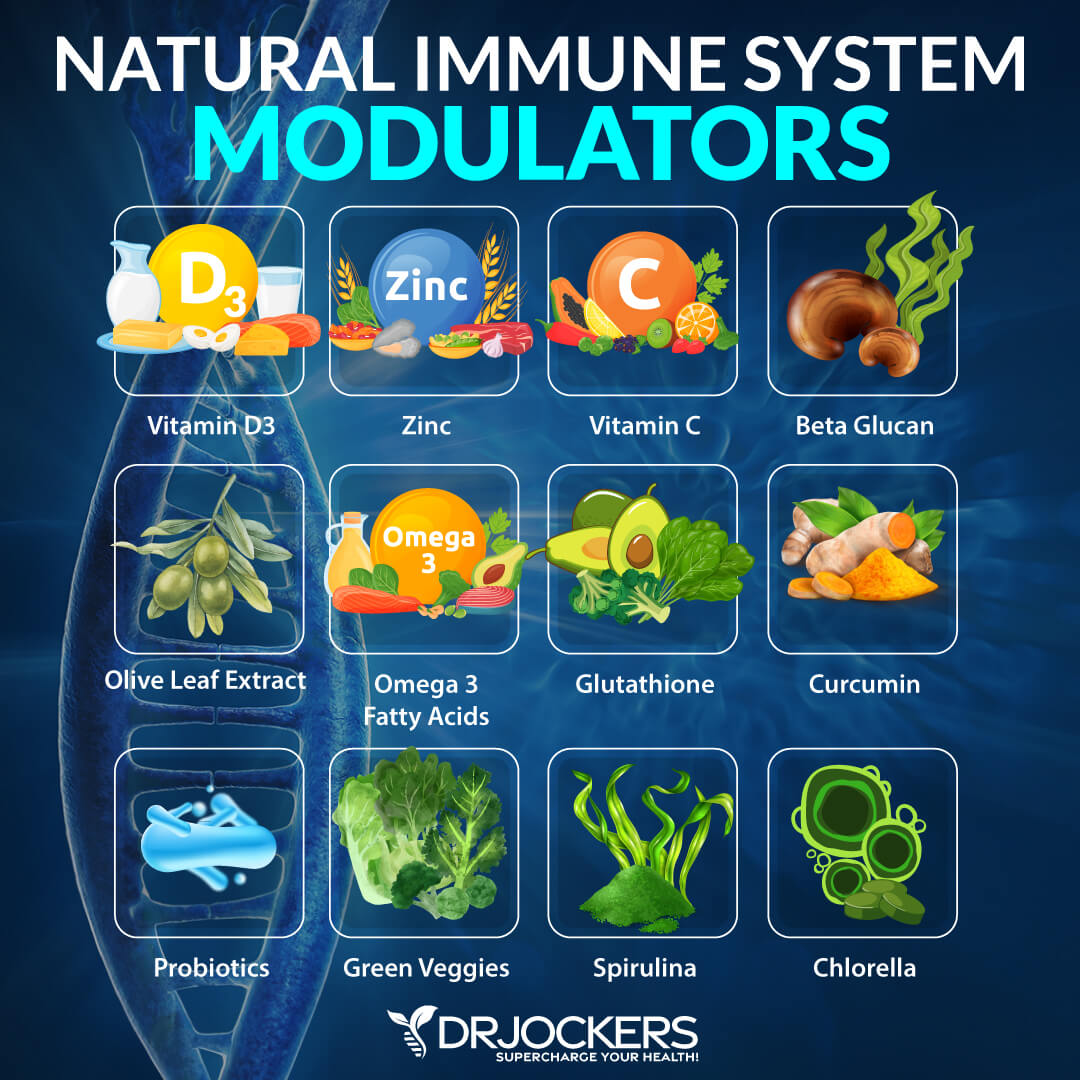
Vitamin D3
Vitamin D is more of a hormone than it is a vitamin. Hormones interact with cells directly to elicit specific biological processes. Due to inadequate sun exposure and organ meat consumption, most people do not have adequate vitamin D levels from a functional perspective. Levels between 50-100 ng/dL seem to provide the greatest benefits.
Getting more sunlight throughout the day and supplementing with 1000 IU per 25 lbs. of body weight is a great way to reach optimal levels. Having a vitamin D (25-OH) test done 1-2 times a year can help monitor vitamin D levels and keep them in the 50-100 ng/dL range.
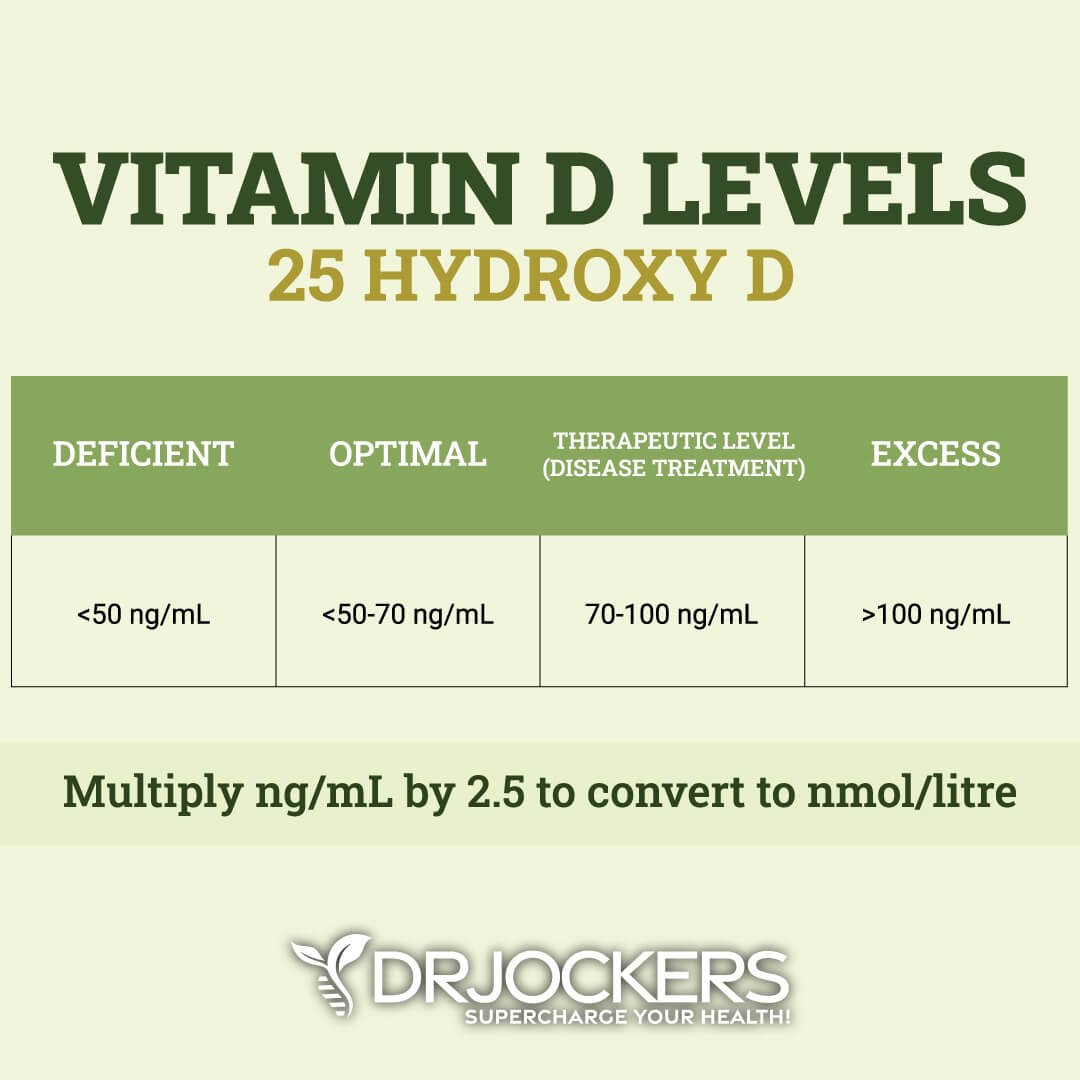
Zinc
Zinc, just like the other immune boosters on this list, is effective for stabilizing an over or under-active immune system. One of the primary mechanisms that zinc works through is the human cytokine interferon alpha (12). This is a protein that plays a role in inhibiting the replication of viruses within the body. Zinc essentially acts as a powerful sidekick for the immune system.
Zinc also plays a role in enzyme function. One of substantial importance is superoxide dismutase (SOD). SOD is one of the body’s most important antioxidants. It is responsible for protecting DNA, preventing viral replication, and protecting against the accumulation of metabolic wastes within cells. I go over a simple home test you can do to discover your zinc status in this article.
A good dose of zinc to take in daily would be between 20-40 mg. This can come from a combination of food sources and supplemental forms. For supplemental form, I recommend an amino acid chelate like zinc glycinate (found in Zinc Charge here).
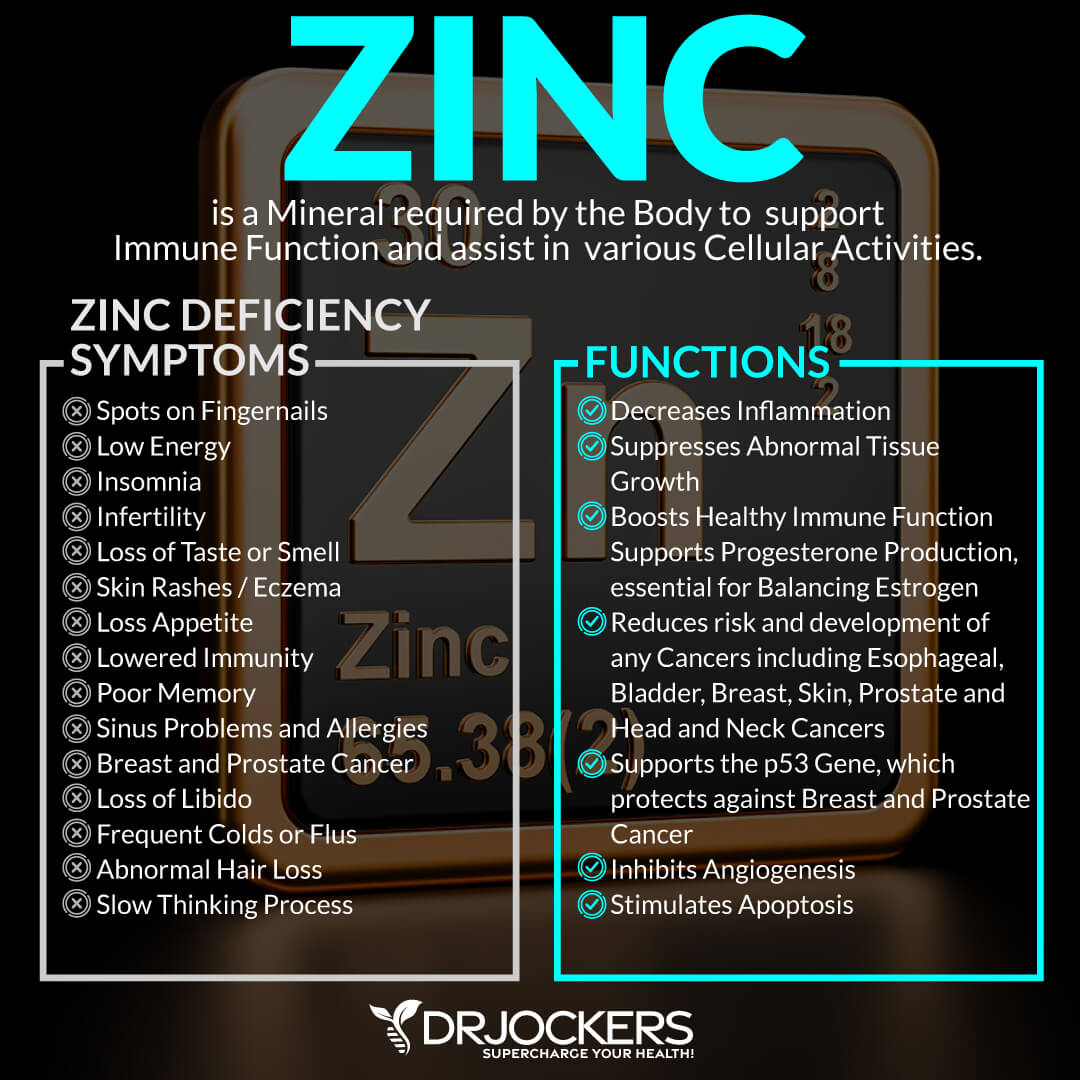 Vitamin C
Vitamin C
Humans are one of the only animals who cannot produce their endogenous supply of Vitamin C. We must get it from external sources like food or through supplementation. White blood cells rely upon Vitamin C to both defend and fight foreign pathogens in the body.
In addition to this, Vitamin C is an important component in controlling inflammatory responses to damaged tissues. Finally, Vitamin C also acts as an antihistamine and helps to control hyperinflammatory responses to things like colds, the flu, and allergies (13, 14, 15).
I recommend our Super C, which has a 1:1 ratio of vitamin C to citrus bioflavonoids which are also called Vitamin P. This combination of Vitamin C and Vitamin P synergizes to uniquely improve immunity, and support adrenal health, and this synergy helps to improve capillary permeability to deliver more oxygen to cells. I personally use 1 gram (2 caps) in the morning upon rising and 1 gram at night before bed to support my adrenal health, circulation, and immune system function.
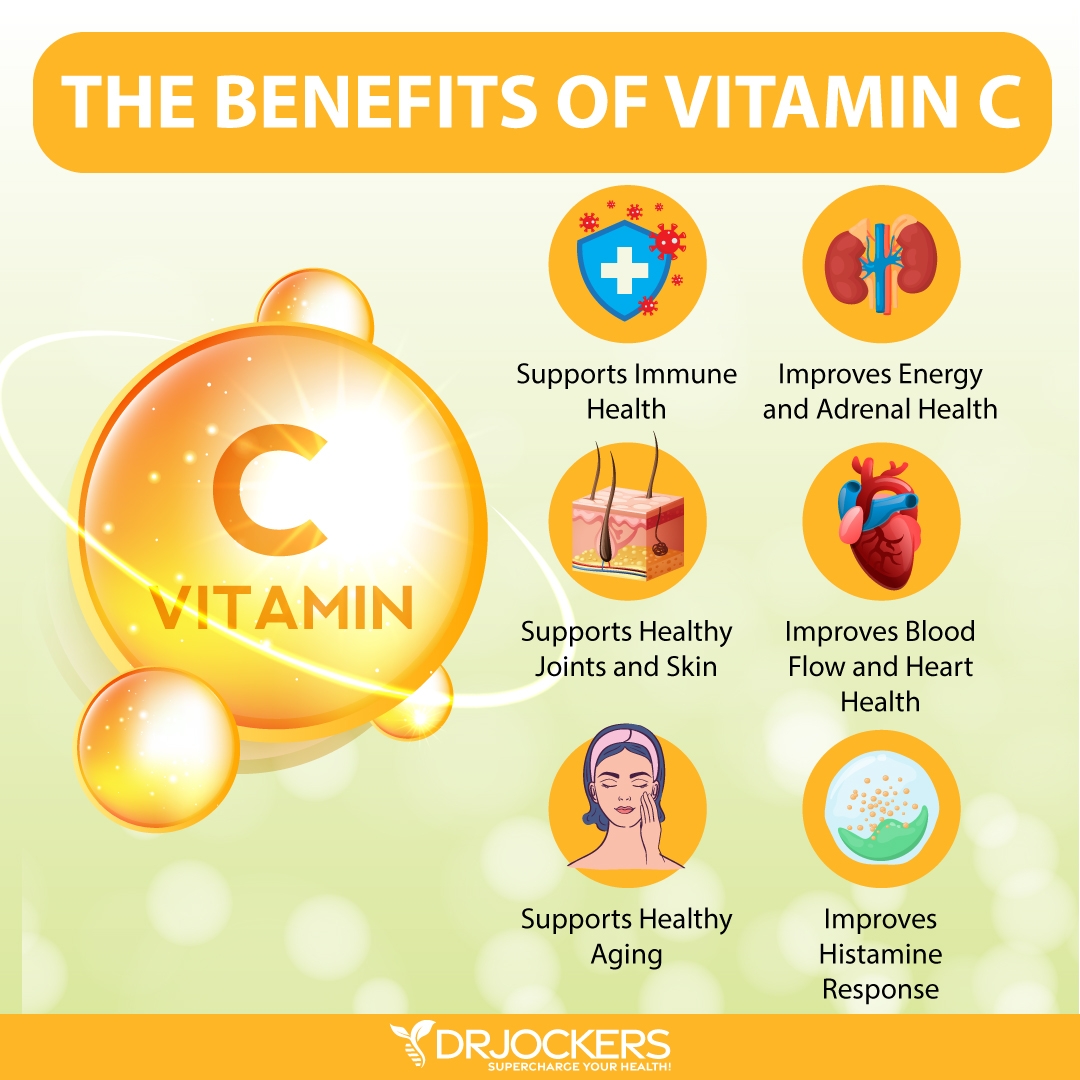
Beta Glucan
Beta-glucan is one of the most balancing immune boosters featured on this list. It is often referred to as a “biological response modifier” which helps to bind to white blood cells and improve their immune coordination.
Beta-glucan compounds are found in mushrooms, yeasts, certain algae, and oats. Beta-glucans are a class of polysaccharide compounds – one of the better studied being 1, 3-D Beta-Glucan. Studies have shown that beta-glucans can activate T-cells, macrophages, natural killer (NK) cells, and cytokines interleukin 1 and 2.
Consequently, research has shown that beta-glucans can help inhibit cancer growth and protect against pathogens (16). Depending on whether you are healthy or dealing with a significant immune challenge, a dose of 500mg all the way to 1000mg – twice daily could be used.
In the next section about olive leaf extract, I will discuss a powerful combination supplement that includes beta-glucan. The best source of beta-glucan that I have found is made by Transfer Point and is available for sale here at BetterWay Health.
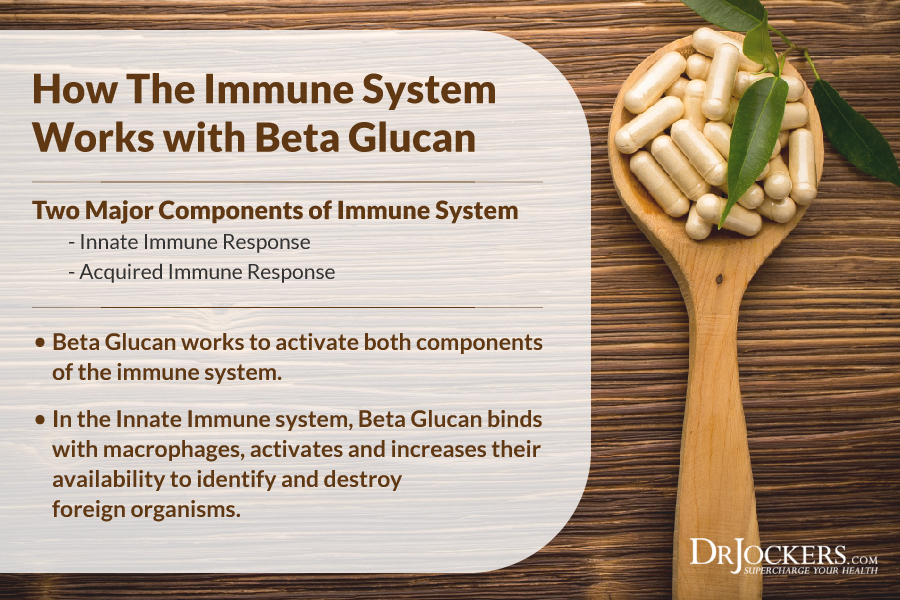
Olive Leaf Extract
Olive leaf is a less commonly known herb that is anti-viral, anti-fungal, and anti-bacterial. In addition to exerting antimicrobial effects, olive leaf extract also supports the immune system by boosting white blood cells’ ability to engulf and destroy microbes.
A 2014 study has shown that oleuropein, the active ingredient in olive leaf extract has anti-inflammatory, antioxidant, and disease-fighting benefits. Olive Leaf extract has been found to work in a dose-dependent manner. This means generally, higher doses are more effective.
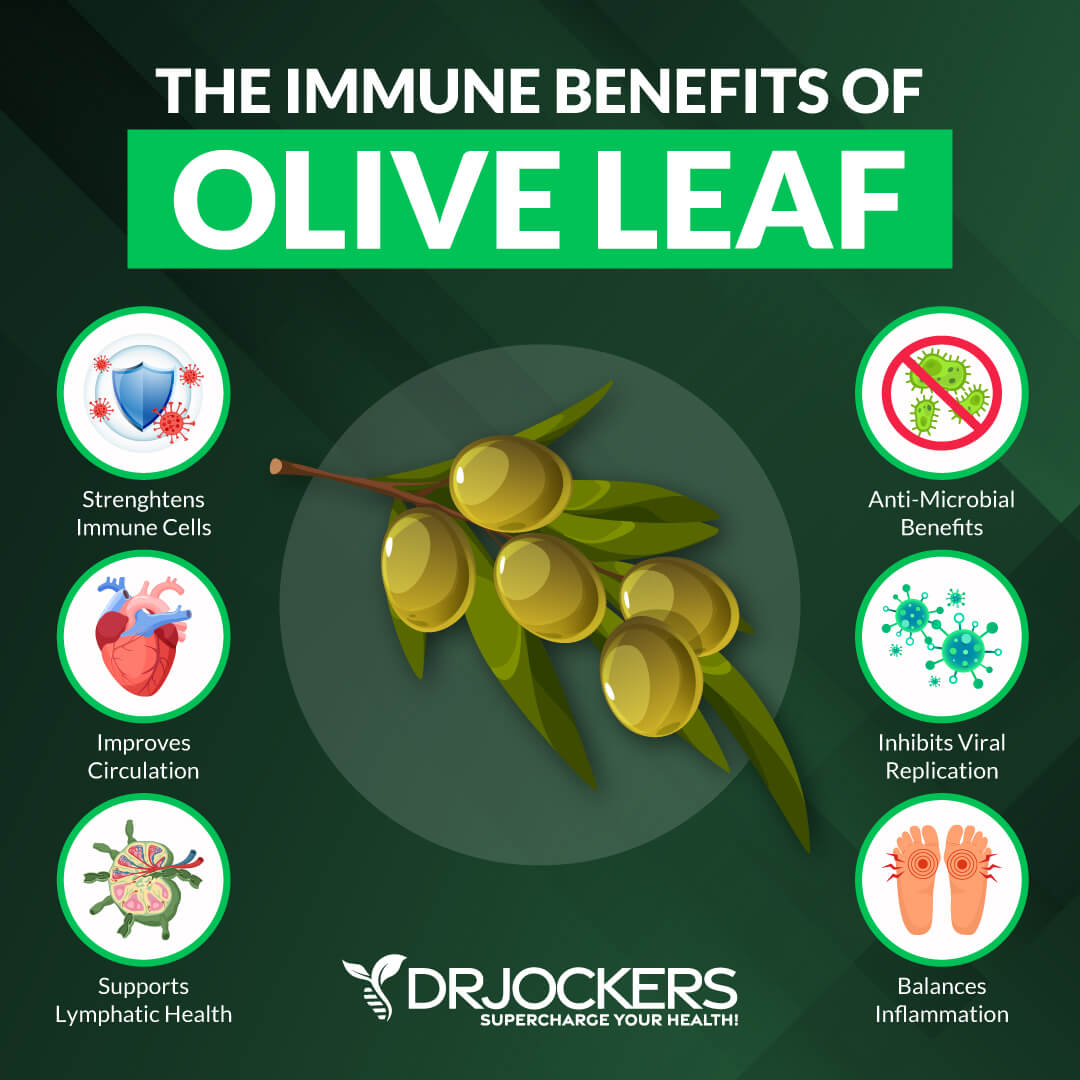
Omega 3 Fatty Acids
Omega 3 fats like Alpha-linolenic Acid (ALA) and Docosahexaenoic Acid (DHA) are important for the body in many ways. It is one of the most underlooked immune boosters. In particular, DHA provides the following benefits:
- Builds Healthy Brain Tissue
- Supports Eye Health
- Improves Mood Balance
- Stabilizes Lipid Levels
- Supports Joint Health
- …and of course, it also supports a healthy immune response.
In fact, one of the most prominent benefits of DHA is its ability to help lower inflammation. Remember, chronic inflammation is often a cause of an overly active immune system (leading to things like autoimmunity and allergies). A study performed on young children supports this idea by observing lower instances of allergies and upper respiratory infections in those who received adequate DHA (17).
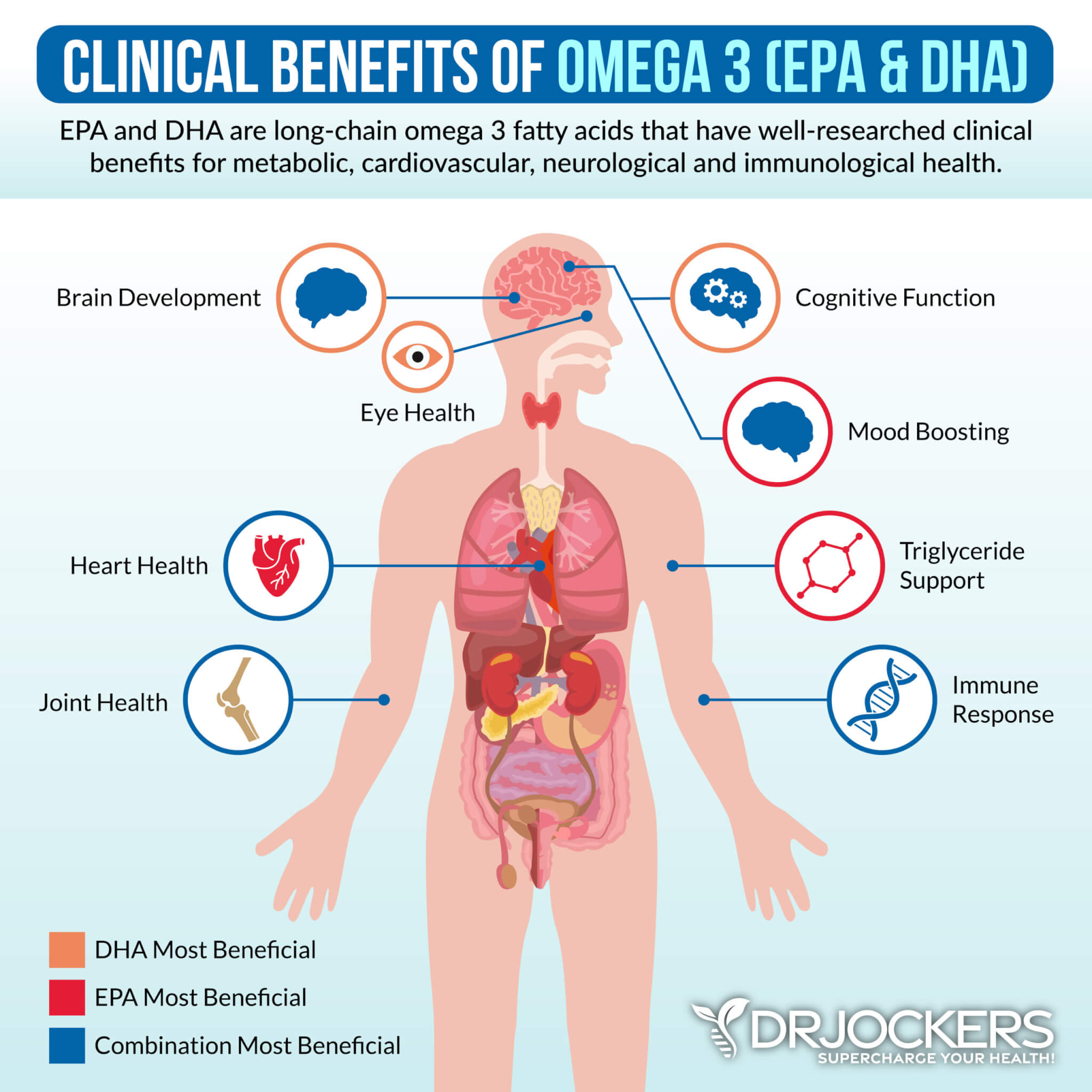
Glutathione
Glutathione is a powerful antioxidant that controls inflammation and helps to regulate other antioxidants in the body, such as Vitamin C. It is also a powerful detoxification agent, helping to remove toxins in the body so that they cannot detract from the immune system.
More specifically, glutathione strengthens something called T cells, which are important for fighting off bacteria, viruses, parasites, and other harmful pathogens (18). Altogether, glutathione provides a fundamental role among the immune boosters on this list.
Glutathione production in the body generally declines with age. There are ways to boost it up, however. Consuming foods that contain glycine, glutamic acid, and cysteine will help provide the building blocks for glutathione. The best foods include avocados, onions, spinach, asparagus, and turmeric. Even better sources for these components are grass-fed whey protein and pastured eggs.
Finally, glutathione can be used in supplemental form. Glutathione supplements are readily available on the market. One issue is that they are not all absorbable. The best forms of glutathione are S-acetylated and liposomal glutathione. I have seen great results with the S-acetylated form in our Super Glutathione product.
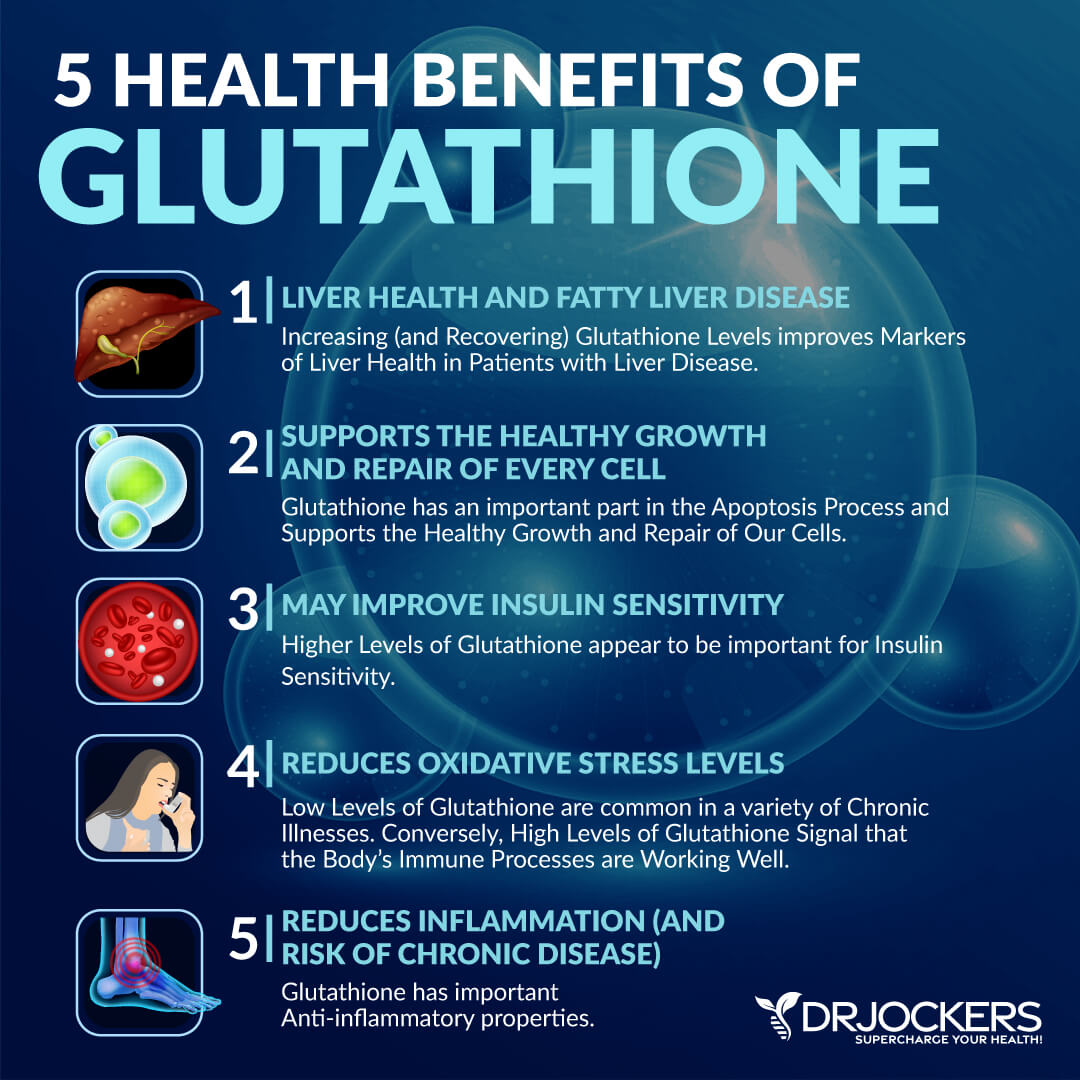
Curcumin
Curcumin is one of the most studied compounds isolated from the turmeric root. It has powerful anti-inflammatory effects as well as a mind-blowingly wide range of systemic benefits in the body. The anti-inflammatory, antioxidant, and cancer-fighting effects are enough to substantially boost the immune system.
Curcumin seems to not just lower inflammation, but also assist the immune system with antibody responses responsible for targeting infections. Curcumin has implicated benefits for arthritis, asthma, allergies, and cancer (19).
One of the most effective anti-inflammatory supplements I have come across is Inflam Defense. This formula combines curcumin, resveratrol, quercetin, ginger, rosemary, and proteolytic enzymes. It is also great to support healthy inflammation and modulate the immune system to be more targeted.
Probiotics
You’ve probably heard by now that the gut is an important part of the immune system. The bacterial balance of the gut helps to prevent harmful pathogens from entering the bloodstream through the digestive tract. Having the wrong kinds of bacteria in your gut can also directly contribute to autoimmune conditions through chronic inflammation (20).
One way to ensure your gut contains the kinds of bacteria that are going to protect you is by supplementing with a probiotic. Certain strains of bacteria like Lactobacillus acidophilus, Bifidobacterium longum, Lactobacillus plantarum, and Bifidobacterium lactis are clinically studied strains of bacteria with multiple health benefits.
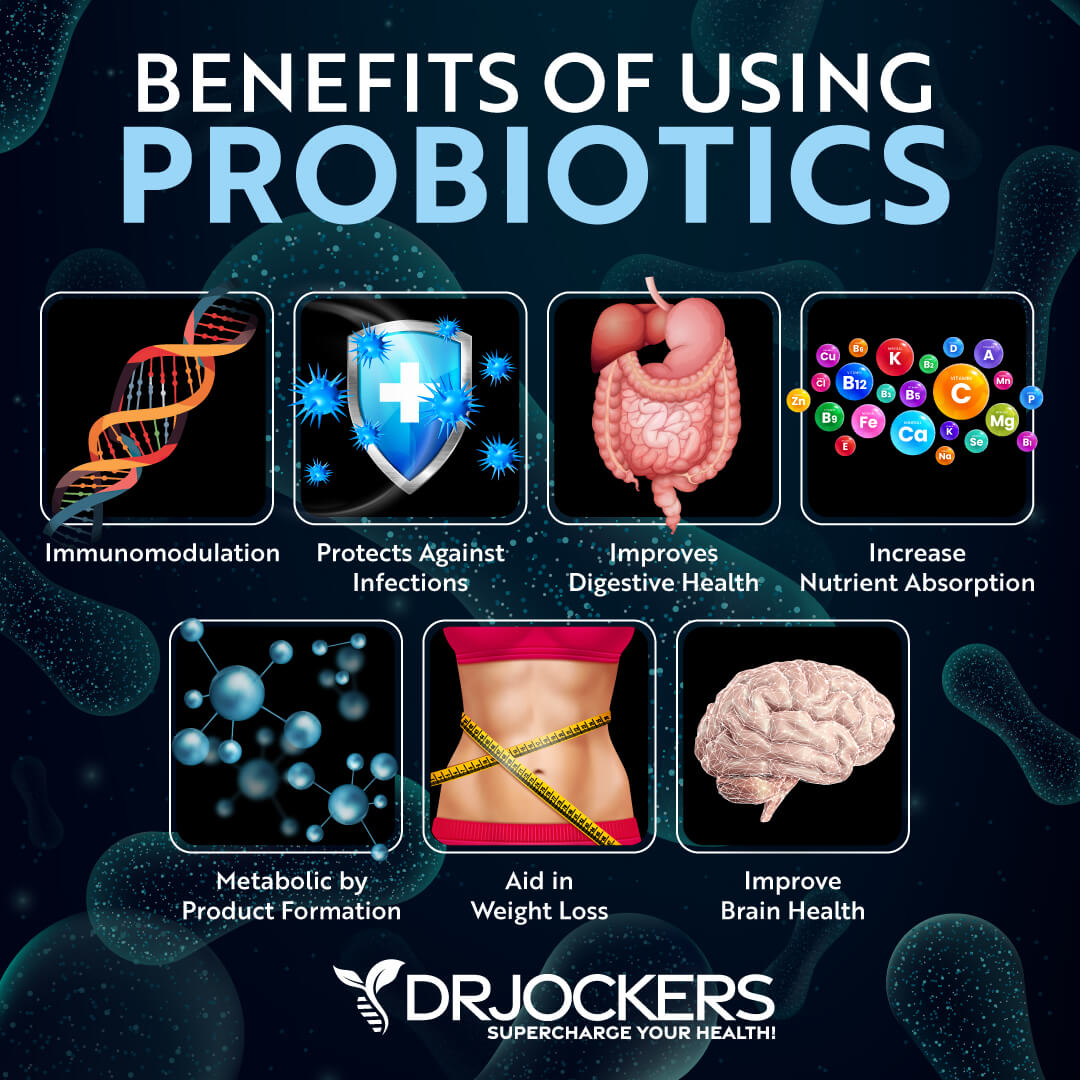
Green Veggies (Greens Powder)
Finally, using greens and superfood powder regularly can be powerful for keeping the immune system strong. Ideally, you want a combination of foods that are detoxifying, anti-inflammatory, micronutrient-dense, and organically sourced.
This can be especially helpful during times of increased demand on the immune system. This is because the combined effects of the superfoods and greens assist the body in several processes to allow the immune system to act more efficiently.
This Organic SuperGreens formula is currently my go-to. It also contains good amounts of the next two immune-boosting foods on the list!
Spirulina
Spirulina is one of the most nutrient-dense foods in the world. It is a blue-green algae that is adaptable to its environment yet very basic in its biology. Consequently, spirulina contains a full array of vitamins, minerals, and powerful pigmented compounds. These pigmented compounds are called phycocyanins and anthocyanins and are extremely powerful antioxidants.
In addition to providing an abundance of nutrients and antioxidants, spirulina also helps to maintain a healthy bacterial balance in the gut. We love the EnergyBits pure spirulina bits.
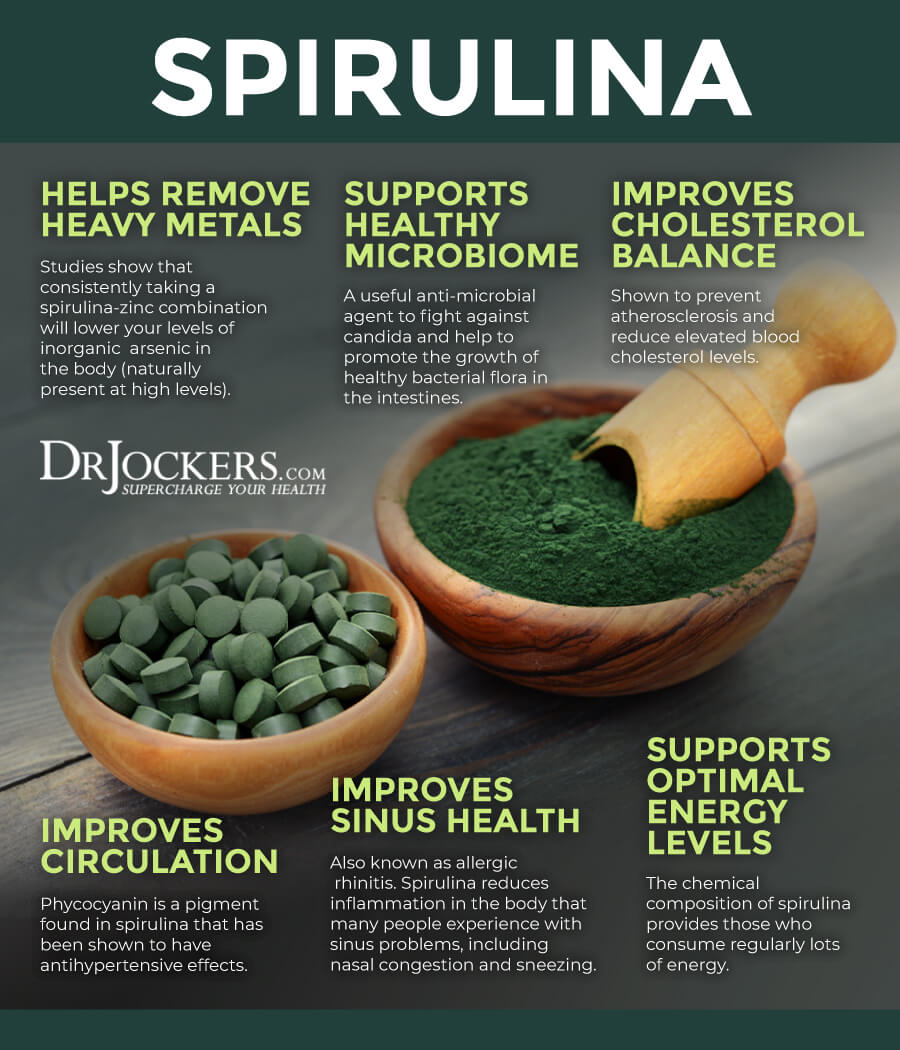
Chlorella
Chlorella is another algae with substantial benefits. It contains an equally impressive nutrition profile and is abundant in the detoxifying compound, chlorophyll. As we talked about earlier, people just don’t get enough sun these days. Chlorophyll actually helps the human body absorb beneficial light waves from the sun and turn them into energy (21)!
Chlorella is one of the most concentrated sources of chlorophyll you can find. Additionally, studies have backed up chlorella’s role among the other immune boosters. Research has shown that components of chlorella help to assist in controlling chronic inflammatory and allergy-like responses of the immune system (22, 23). I really like and personally take and give my kids RecoveryBits Pure Chlorella bits.
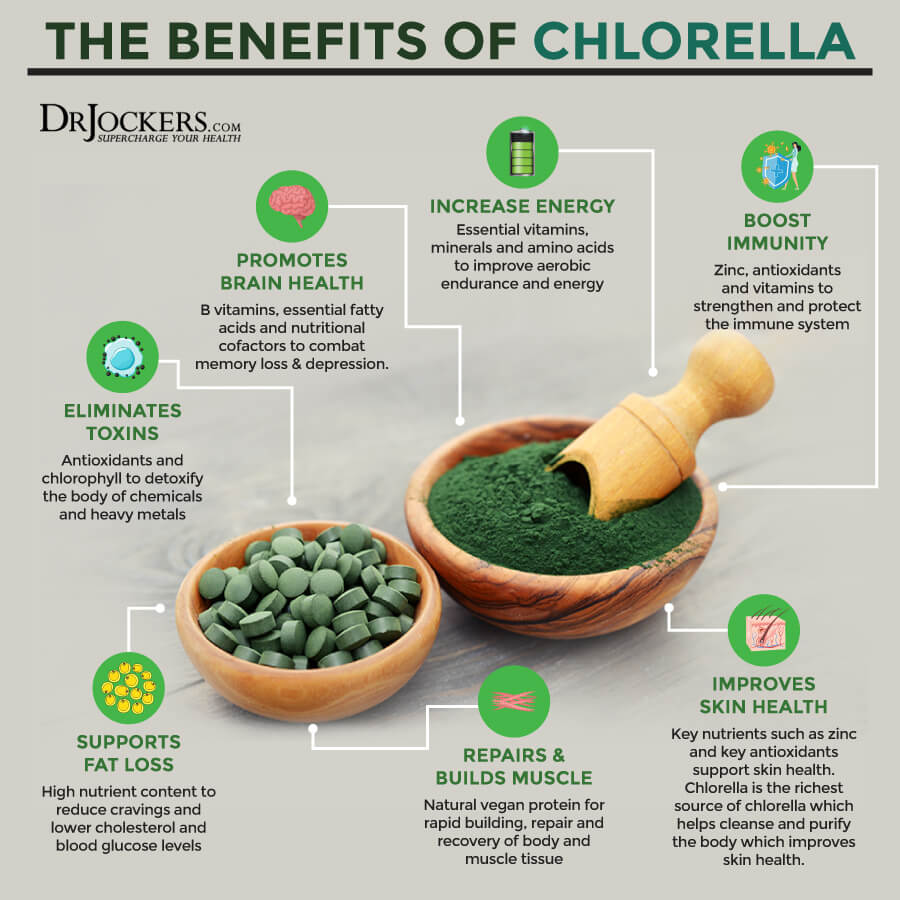
Immunocharge
ImmunoCharge™ is one of my favorite supplements for immune health. It is powered by quercetin, resveratrol, vitamin D, vitamin A, selenium, zinc, vitamin C, N-Acetyl Cysteine (NAC), vitamin K2, and magnesium. These ingredients support the body’s natural immune mechanisms to help maintain good health. This formula is designed to be taken short term.
It has anti-viral potential, antioxidant benefits, and immune health benefits. I have found it to be the very best immune support supplement on the market!
Take 2 capsules, 2 times a day with meals for appropriate immune health support. For advanced support, I recommend 3 capsules, twice a day. If someone is suffering from a seasonal immune challenge, I will often have people do 4 capsules every 4-6 hours with a meal until they knock out whatever immune challenge they are suffering with.
***Special Offer: Save 30% on Immunocharge with the coupon code Immune30 at checkout!
Summary
Our bodies are constantly fighting foreign pathogens to keep us healthy. When the immune system is weakened or is highly distracted by chronic inflammatory processes, this can lead to infections or things like autoimmunity.
Luckily, there is a wide range of compounds that are excellent immune boosters. The compounds listed in this article are immune boosting in a way that will not over-stimulate the immune system but rather keep it operating as efficiently as possible.
If you want to work with a functional health coach, I recommend this article with tips on how to find a great coach. Our website offers long-distance functional health coaching programs. For further support with your health goals, just reach out and our fantastic coaches are here to support your journey.
Inflammation Crushing Ebundle
The Inflammation Crushing Ebundle is designed to help you improve your brain, liver, immune system and discover the healing strategies, foods and recipes to burn fat, reduce inflammation and Thrive in Life!
As a doctor of natural medicine, I have spent the past 20 years studying the best healing strategies and worked with hundreds of coaching clients, helping them overcome chronic health conditions and optimize their overall health.
In our Inflammation Crushing Ebundle, I have put together my very best strategies to reduce inflammation and optimize your healing potential. Take a look at what you will get inside these valuable guides below!


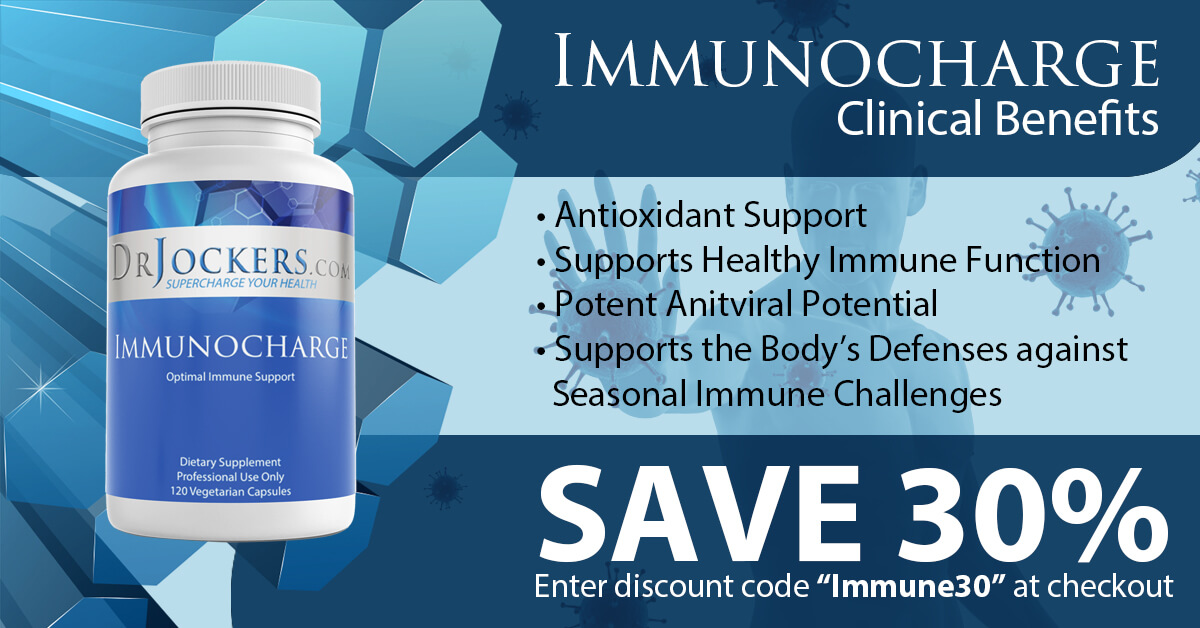





I wish that you were in Canada as Being on a fixed income and elderly I can’t afford your products but I sure apply what you say when I can and it makes a BIG difference.
Glad to have you in our community Perley!!
Great information, but I don’t know how to address my vitamin-C level. Oat showed high oxalic level due to very high intake of both glycine and Ascorbic Acid prior to the test. I now take 600mg/d of ALA, but with an AA level of only 1.2, I have serious doubts that the ALA will keep much of the AA from degrading to oxalates. I have switched my magnesium over from glycinate to citrate for use as a binder and greatly reduced my other glycine exposures. I would appreciate your thoughts on my vitamin-c.
Hey Louise, I typically recommend 500-800 mg of vitamin C daily for those with high oxalates.
Were the bones and muscles supposed to have the same autoimmune diseases in the chart on this article? Great info by the way. Sure do appreciate you!
Thanks Patti! Yes the same AI conditions that impact the muscles also impact bones and joints!
Thankyou , lots of resources for my Lupus advocacy page! I suspect I have fibro, not diagnosed, simply because its so hard to explain to doctors, also have a daughter with Lupus nephritis, and another trying to treat high cholesterol by eating differently, she is not overweight by the way so could be genetic?
Thanks again
Regards
Dawn
Sorry to hear about all the issues with your daughters. Glad we could provide some helpful info for you here Dawn! Blessings to you!
Thank you for this article. I’m curious if essential oilsdamage the leukocytes or lymphocytes?
Not that I am aware of Angela!
Interesting is there a blood test to show just how good you immure system is?
You would think with cancer going rampant it would be a good test.
Maybe data could be collected from a number of blood tests like ‘white blood cell count’ and it could be put into a formula and come up with some kind of result.
Yes for sure! Thanks for sharing!
I would add quercetin to this list as it is a zinc ionophore. I would also change glutathione to NAC as glutathione is poorly absorbed while NAC is better absorbed and is the key building block of glutathione.
THANK YOU DR JOCKERS FOR SHARING SUCH VALUABLE INFORMATIONS.
So, how can all the above information and highly nutritional foods help me with three infections called Klebsiella, clostridia, and Aspergillus. Have taken anti-inflammatory meds for years; now colitis, Ankylosing spondylitis, etc, etc?
Frank
Sorry to hear this Frank. I would begin making the key lifestyle changes so you can heal! Praying for you!
Prescription drugs will only make you worse. Please read my healing testimony here. https://mountaingrannys.com/
Thank you Elsa! Blessings!
Good Day. Would like to know what you think about Moringa. Thanks
Yes it is a great antioxidant rich plant you can use to support your immune system and cellular health!
For how long you have to take Probiotics to make a diference? Is this a life long intake or is anought to take it for 3-6 months?
You can get clinical benefits from probiotics in a week or 2. Many people choose to stay on them, but many only use them seasonally. Here is a helpful article: https://drjockers.com/probiotics-benefits-categories-and-protocols/
Thank you!
I actualy try to get some good quality probiotics to help me with my Histamin Intolerance. I tried alot of stuffs in my 6-7 years of batteling with chronic urticaria because of Histamin. Till now only antihistamines are helping (cetirizin) but I want to get rid of them so I try to find a more natural way of dealing with this histamin intolerance/chronic urticaria.
I am liveing in Germany and I come acros this probiotics: https://www.madena.de/shop/histaex_synbio/
It would be to much to ask you about your opinion on this product? It has the strains you recomand on the article up.
I am taking it for about 1 week and my simptoms got a bit better but if I am not taking the antihistamines, simptoms (urticaria) are comeing back.
I know it has alot to do also with my diet. During the week I manage to eat properly (mostly organic, high quality fats and fibers (from oats and wholegrains – I know, grains are bad :P, greens, etc.) but in the weekend it all goes south 😛 I get some alchoohol, pizza and co., in. I am pretty sure this is distroing all my progress made during the week 🙁 ? Is kind of like a family “tradition” to eat some junk food in the weekend. My son and wife are perfectly healthy so I can not tell them they should stop this and I find it very hard to skip this on my own. I managed this for 3 months but my urticaria was not going away so I said: well if is not going away in 3 months of eating clean it may never go away. So I started to participate again in the wekeend junk days routine.
Yes it looks like a good product and I am happy to hear you are feeling better. Blessings!
Thank you very much!
Good day Dr Jockers, I have become histamine intolerant as well as having a problem with high oxalates. Is this health problem reversible, my diet is extremely limited and
most of your nourishing recipes contain histamine rich foods.
Yes, sorry to hear this, you will want to follow the instructions here: https://drjockers.com/suffering-histamine-intolerance/
Great information but it is sad that you are pushing the same narrative about covid coming back. There is a general viral uptick, which is completely normal and nothing to be concerned about.
Hello Laura, we aren’t pushing a narrative about COVID coming back, we are focused on helping people build healthy immune systems.
Reynauds- what can I do to help minimize symptoms or reach a cure?
Here is a helpful article: https://drjockers.com/raynauds-phenomenon/
Hi Dr Jockers
So I am confused on the Vitamin D3 improving the immune system.
I am 61 years old, 6ft, 165 lbs. I exercise 5-6 days a week.
I have two bottles of Vitamin D3. One is 5000IU with and has Vitamin K2 MK7. I take this one 3 days a week. The other is just plain D3 but is a little high in dose at 10000IU with no K2 in it. I randomly take this higher does maybe 4 times a week.
Had my physical and was disappointed in my blood test results. My Vitamin D level was at 134.2, yes too high. But for being higher than it should be my LYMPH# was only 1.2.
How can my D be so high yet my immune fighter be so low?
Also I find I am getting sick more frequently since August I have gotten a cold 4 times.
My RBC is a little low too at 4.48. REW-SD is high at 48.2.
I know you cannot give advice but could you PLEASE maybe give me some insight?
Thank you
Mark
Re: Zinc
What is the difference between gluconate and sulfate?!?
This article seems to highlight things to strengthen or boost the immune system but how do you modulate the immune system to bring it back to normal from hyperactivity?
One day you will add the benefits abd necessity of Glycans